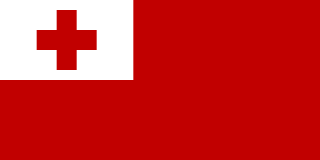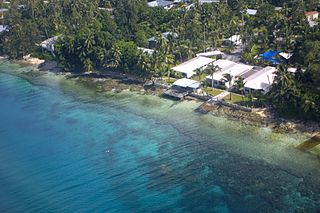This article needs additional citations for verification .(February 2022) |
Rugby union in the Marshall Islands is a minor but growing sport.
This article needs additional citations for verification .(February 2022) |
Rugby union in the Marshall Islands is a minor but growing sport.
Rugby was introduced to the islands at some point in the twentieth century.
Like many other Pacific nations, rugby is often not formally organised. Due to their small numbers, and scattered island population, they have often preferred rugby sevens to the XV game. However, rugby is less popular in the Marshall Islands, than some of the other Pacific islands.
Rugby Sevens has been a sport in the South Pacific Games since the late 1990s. [1]
The Marshall Islands' main problems are related to population and geographical factors - their population is 61,963, and lives on 29 coral atolls and 5 isolated islands in the South Pacific Ocean. All of this makes a rugby infrastructure difficult to construct, and the islands are beset by rising sea levels. The geographic future of the Marshall Islands depends on the height of the ocean. No significant land is more than two metres above high water of ordinary tides. This means they are particularly vulnerable to any possible sea level rises caused by global warming. [2] There is also a lack of land for specifically designated rugby pitches.
Much of the playing population consists of Fijians and Tongans, along with some Americans.

Kiribati, officially the Republic of Kiribati, is an island country in the Micronesia subregion of Oceania in the central Pacific Ocean. Its permanent population is over 119,000 as of the 2020 census, with more than half living on Tarawa atoll. The state comprises 32 atolls and one remote raised coral island, Banaba. Its total land area is 811 km2 (313 sq mi) dispersed over 3,441,810 km2 (1,328,890 sq mi) of ocean.

The Marshall Islands, officially the Republic of the Marshall Islands, is an island country west of the International Date Line and north of the equator in the Micronesia region in the Northwestern Pacific Ocean. The territory consists of 29 coral atolls and five islands, divided across two island chains: Ratak in the east and Ralik in the west. 97.87% of its territory is water, the largest proportion of water to land of any sovereign state. The country shares maritime boundaries with Wake Island to the north, Kiribati to the southeast, Nauru to the south, and the Federated States of Micronesia to the west. The capital and largest city is Majuro, home to approximately half of the country's population.

The Marshall Islands consist of two archipelagic island chains of 30 atolls and 1,152 islands, which form two parallel groups—the "Ratak" (sunrise) chain and the "Ralik" (sunset) chain. The Marshalls are located in the North Pacific Ocean and share maritime boundaries with Micronesia and Kiribati. Two-thirds of the nation's population lives in the capital of Majuro and the settlement of Ebeye. The outer islands are sparsely populated due to lack of employment opportunities and economic development.

Oceania is a geographical region including Australasia, Melanesia, Micronesia, and Polynesia. Outside of the English-speaking world, Oceania is generally considered a continent, while Australia is regarded as an island or a continental landmass contained inside of the larger continent of Oceania. Spanning the Eastern and Western Hemispheres, at the centre of the water hemisphere, Oceania is estimated to have a land area of about 9,000,000 square kilometres (3,500,000 sq mi) and a population of around 44.4 million as of 2022. When compared to the continents, Oceania is the smallest in land area and the second-least populated after Antarctica.

Rugby football is the collective name for the team sports of rugby union or rugby league.

Rugby union football, commonly known simply as rugby union or more often just rugby, is a close-contact team sport that originated at Rugby School in England in the first half of the 19th century. Rugby is based on running with the ball in hand. In its most common form, a game is played between two teams of 15 players each, using an oval-shaped ball on a rectangular field called a pitch. The field has H-shaped goalposts at both ends.

Rugby sevens is a variant of rugby union in which teams are made up of seven players playing seven-minute halves, instead of the usual 15 players playing 40-minute halves. Rugby sevens is administered by World Rugby, the body responsible for rugby union worldwide. The game is popular at all levels, with amateur and club tournaments generally held in the summer months. Sevens is one of the most well distributed forms of rugby, and is popular in parts of Africa, Asia, Europe, and the Americas, and especially in the South Pacific.

An island country, island state, or island nation is a country whose primary territory consists of one or more islands or parts of islands. Approximately 25% of all independent countries are island countries. Island countries are historically more stable than many continental states but are vulnerable to conquest by naval superpowers. Indonesia is the largest and most populated island country in the world.

Rugby union in Samoa is the country's most popular sport. The national teams in both the standard 15-man game and rugby sevens are consistently competitive against teams from vastly more populous nations.

Rugby union is the national sport of Tonga. Tonga are considered to be a tier 2 rugby nation by the International Rugby Board.
A national sports team is a team that represents a nation, rather than a particular club or region, in an international sport.

Sport in Tonga consists of many games. Rugby union is the national sport, sumo has a following, while football, judo, surfing, volleyball, and cricket have gained popularity in recent years. Rugby league and Australian football are also played.
Rugby union in French Polynesia, particularly on the main island of Tahiti, is a popular team sport. Rugby union was first introduced by British, Kiwi and Australian sailors, and also through the French and the strong presence of the game amongst Pacific Nations. Top Tahitian clubs participate in the domestic club league, the Championnat de Tahiti. Clubs also competed in friendlies vs foreign club teams from neighboring nations as far across the Pacific to Chile.
Rugby union in the Federated States of Micronesia is a minor but growing sport.
Rugby union is a popular sport in Tokelau.
Rugby union is played in Tuvalu. Unlike most South Pacific islands, rugby union is largely played on an informal basis,. alongside association football, which is the main sport played by Tuvaluans.

Rugby union in Wallis and Futuna is a popular sport within the French overseas territory.

Sport in Oceania varies from country to country. The most popular playing sport for men in Australia is Australian rules football, while for women is netball. Australian rules football is the most popular sport in terms of spectatorship and television ratings. Rugby union is the most popular sport among New Zealanders, while in Papua New Guinea rugby league is the most popular. Cricket is another popular sport throughout the Oceania region.

The effects of climate change on small island countries are affecting people in coastal areas through sea level rise, increasing heavy rain events, tropical cyclones and storm surges. These effects of climate change threaten the existence of many island countries, their peoples and cultures. They also alter ecosystems and natural environments in those countries. Small island developing states (SIDS) are a heterogenous group of countries but many of them are particularly at risk to climate change. Those countries have been quite vocal in calling attention to the challenges they face from climate change. For example, the Maldives and nations of the Caribbean and Pacific Islands are already experiencing considerable impacts of climate change. It is critical for them to implement climate change adaptation measures fast.

Climate change in the Marshall Islands is a major issue for the country. As with many countries made up of low-lying islands, the Marshall Islands is highly vulnerable to sea level rise and other impacts of climate change. The atoll and capital city of Majuro are particularly vulnerable, and the issue poses significant implications for the country's population. These threats have prompted Marshallese political leaders to make climate change a key diplomatic issue, who have responded with initiatives such as the Majuro Declaration.